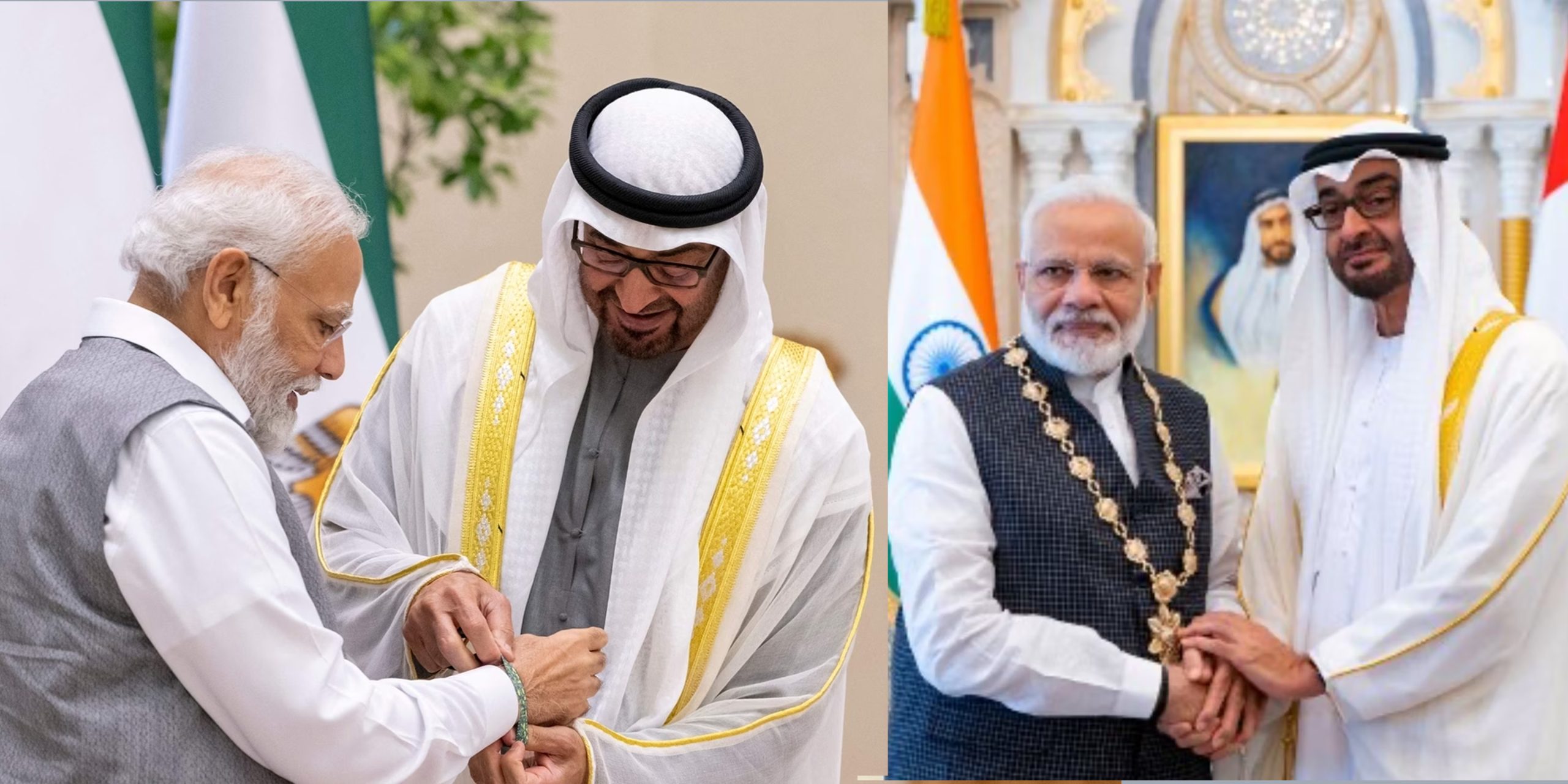In a significant development during Prime Minister Narendra Modi’s visit to the United Arab Emirates (UAE), the Reserve Bank of India (RBI) and the Central Bank of the UAE signed two crucial memoranda of understanding (MoUs). These agreements aim to foster stronger economic ties between India and the UAE by promoting the use of local currencies for cross-border transactions and interlinking payment systems. This creative blog delves into the details of the two MoUs, the benefits of trading in local currencies, and the advantages of linking the Unified Payments Interface (UPI) with the UAE’s Instant Payment Platform (IPP).
The Two Memoranda of Understanding (MoUs)
Local Currency Settlement System (LCSS)
The first MoU between the RBI and the Central Bank of the UAE establishes a framework for a Local Currency Settlement System (LCSS). The objective is to promote the use of the Indian rupee (INR) and the UAE dirham (AED) for bilateral trade. This system will cover all current account transactions and permitted capital account transactions. The LCSS will enable exporters and importers to invoice and pay in their respective domestic currencies, facilitating the development of an INR-AED foreign exchange market. Additionally, the system will promote investments and remittances between the two countries, optimizing transaction costs and settlement times for cross-border transactions.
Interlinking Payment Systems
The second MoU focuses on interlinking payment systems between India and the UAE. Specifically, it aims to link India’s Unified Payments Interface (UPI), known for its fast, secure, and convenient funds transfer, with the UAE’s Instant Payment Platform (IPP). This linkage will allow users in both countries to make cross-border fund transfers more efficiently, safely, and cost-effectively. Furthermore, the MoU seeks to connect the respective Card Switches of both countries, namely the RuPay switch in India and UAESWITCH in the UAE, enabling the mutual acceptance of domestic cards and facilitating card transactions.
How Trading in Local Currencies Helps
1.Boosting Bilateral Trade and Investment
Promoting the use of local currencies in cross-border transactions can significantly boost bilateral trade and investment between India and the UAE. By eliminating the need for intermediary currencies like the US dollar, trading in INR and AED directly simplifies transactions and reduces associated costs.
2.Strengthening Foreign Exchange Markets
The establishment of the INR-AED foreign exchange market through the LCSS creates a conducive environment for more transparent and stable currency exchange between the two nations. This contributes to strengthening the financial ties and stability between India and the UAE.
3.Fostering Economic Cooperation and Trust
Conducting trade using local currencies symbolizes a deepening economic cooperation and mutual trust between India and the UAE. It reflects a commitment to long-term collaboration and a shared vision of enhancing economic ties.
Benefits of Linking UPI and IPP
Faster and Convenient Cross-Border Fund Transfers
Linking India’s UPI with the UAE’s IPP enables individuals and businesses in both countries to conduct cross-border fund transfers rapidly and conveniently. This direct connection eliminates delays associated with traditional banking channels and intermediary banks.
1.Secure and Cost-Effective Transactions
UPI and IPP are known for their robust security measures, ensuring safe and reliable fund transfers. Additionally, these transactions tend to be more cost-effective than traditional international wire transfers, benefiting both consumers and businesses.
2.Facilitating International Trade and Investments
The UPI-IPP linkage facilitates smoother international trade and investments between India and the UAE. It empowers businesses to engage in seamless financial transactions, enhancing economic interactions and investment opportunities.
3.Boosting Financial Inclusion and Digital Payments
One of the significant advantages of linking India’s Unified Payments Interface (UPI) with the UAE’s Instant Payment Platform (IPP) is the potential to boost financial inclusion and promote digital payments in both countries. Both India and the UAE have been actively promoting the digitalization of financial transactions, and this collaboration takes the effort a step further.
In India, UPI has already witnessed tremendous success in driving digital payments. It allows users to make instant money transfers, pay bills, and even make purchases at both online and offline stores. By extending this system to the UAE, Indian expatriates residing in the UAE will benefit from a familiar and efficient payment method, encouraging them to embrace digital payments more readily. This, in turn, will reduce their reliance on cash transactions, enhance financial security, and contribute to the overall growth of the digital economy.
Similarly, the IPP in the UAE has been a major driving force behind the country’s digital payment revolution. The platform enables individuals and businesses to make real-time fund transfers without any geographical limitations. By linking the IPP with India’s UPI, UAE residents and businesses will gain access to a broader range of digital payment options, making it easier for them to conduct transactions with Indian counterparts. This seamless cross-border digital payment capability will foster a sense of financial integration between the two nations and open up new avenues for commerce and collaboration.
Moreover, the collaboration between UPI and IPP can also facilitate financial inclusion for Indian workers in the UAE. Many Indian expatriates work in low-wage jobs and rely on remittances to support their families back home. By leveraging digital payment systems, these workers can send money more efficiently and at lower costs. This will not only improve their financial well-being but also contribute to the overall economic development of both countries.
4.Strengthening Economic Resilience and Reducing Currency Risks
The Local Currency Settlement System (LCSS) established through the MoU between the RBI and the Central Bank of the UAE holds the potential to strengthen the economic resilience of both nations. Traditionally, international trade relies heavily on the US dollar as the intermediary currency for transactions. However, this dependency on a single currency exposes countries to currency risks and fluctuations.
By promoting the use of the Indian rupee (INR) and the UAE dirham (AED) in bilateral trade, both India and the UAE can reduce their reliance on the US dollar and diversify their foreign exchange reserves. This diversification can act as a hedge against currency volatility, minimizing the impact of global economic uncertainties on their respective economies
Furthermore, conducting trade in local currencies enhances the stability of exchange rates and reduces transaction costs. Businesses will no longer need to account for exchange rate fluctuations, eliminating potential losses arising from sudden currency devaluations. This stability and predictability create a more favourable environment for trade and investment, fostering economic growth and attracting foreign investors looking for stable and less risky markets.
Additionally, the LCSS encourages greater usage of domestic currencies, which, in turn, can lead to increased demand for INR and AED in the global market. As demand rises, the value and international standing of these currencies can strengthen, further bolstering their positions as reliable and stable currencies for international transactions.
5.Strengthening Geopolitical Relations and Regional Cooperation
The signing of the MoUs between India and the UAE signifies a deepening of geopolitical relations and regional cooperation. The two nations have historically shared strong cultural and economic ties, and these agreements solidify their commitment to further enhancing cooperation.
Economically, the bilateral agreements reinforce India’s position as a strategic partner in the Gulf region. The UAE is one of India’s largest trading partners in the Gulf Cooperation Council (GCC) countries. By promoting the use of the INR and AED in cross-border transactions, India and the UAE demonstrate their willingness to strengthen regional trade ties and reduce dependency on third-party currencies.
Moreover, the collaboration on financial infrastructure and payment systems opens up opportunities for future collaborations in other sectors. Both countries can explore joint investment projects, technology transfers, and knowledge sharing to promote innovation and development in key industries.
On the geopolitical front, the strengthened economic ties can lead to increased diplomatic cooperation between India and the UAE. The two nations can find common ground on regional and global issues, share intelligence, and collaborate on security matters. This alignment can lead to more significant contributions to regional stability and security, benefiting both countries and the broader region.
6.Facilitating Small and Medium-sized Enterprises (SMEs) Growth
The India-UAE deal to trade with local currencies and interlink payment systems holds particular significance for Small and Medium-sized Enterprises (SMEs) operating in both countries. SMEs play a crucial role in driving economic growth, generating employment opportunities, and fostering innovation. However, these businesses often face challenges when engaging in cross-border trade, primarily due to high transaction costs, currency conversion fees, and complex payment processes.
By promoting the use of local currencies for cross-border transactions, the RBI and the Central Bank of the UAE aim to reduce transaction costs and simplify payment procedures for SMEs. With the Local Currency Settlement System (LCSS) in place, SMEs can now conduct business with their UAE counterparts in Indian rupees, streamlining financial transactions and eliminating the need for currency conversions.
The simplified payment process also leads to faster fund settlements, enabling SMEs to receive payments promptly and efficiently. This improved liquidity can be a game-changer for small businesses, as it allows them to better manage their cash flow and invest in expansion and innovation. Furthermore, the reduced reliance on intermediary banks and third-party currencies minimizes transaction delays, providing SMEs with greater certainty in their international trade transactions.
Moreover, the interlinking of payment systems through the Unified Payments Interface (UPI) and the Instant Payment Platform (IPP) offers SMEs more flexible and secure payment options. The convenience of digital payments facilitates swift cross-border fund transfers, making it easier for businesses to engage in international trade. Additionally, the secure nature of these digital payment systems ensures that SMEs can transact with confidence, free from concerns about fraud and unauthorized access.
Overall, the India-UAE deal benefits SMEs in both countries by fostering a more conducive and supportive environment for cross-border trade. As these businesses continue to flourish, they contribute to job creation, economic growth, and technological advancement in India and the UAE.
7.Strengthening the Financial Services Sector
The collaboration between the Reserve Bank of India (RBI) and the Central Bank of the UAE in establishing the Local Currency Settlement System (LCSS) and interlinking payment systems extends beyond the realm of trade and commerce. It also holds the potential to strengthen the financial services sector in both countries.
The LCSS, designed to promote the use of the Indian rupee and the UAE dirham in bilateral trade, encourages financial institutions to diversify their service offerings. As banks and financial institutions gear up to facilitate transactions in local currencies, they will need to develop expertise in handling these currencies efficiently. This will foster innovation and growth in the financial services sector, encouraging banks to introduce new products and services tailored to the needs of businesses engaged in cross-border trade.
Furthermore, the LCSS creates opportunities for banks to expand their correspondent banking relationships. As trade between India and the UAE grows, financial institutions in both countries may seek partnerships to enhance their capabilities and improve their cross-border transaction services. This collaboration can lead to the development of strong financial networks, facilitating seamless and efficient fund transfers.
The interlinking of payment systems, specifically the Unified Payments Interface (UPI) and the Instant Payment Platform (IPP), also plays a pivotal role in strengthening the financial services sector. The integration of these systems allows financial institutions to offer faster, safer, and more cost-effective cross-border payment solutions to their customers. It empowers banks to cater to the evolving needs of individuals and businesses, especially in the digital era, where speed and convenience are paramount.
Moreover, the linkage of the UPI and IPP can spur innovation in the fintech space. Fintech companies in India and the UAE may collaborate to leverage the payment systems’ capabilities, creating innovative financial products and services that cater to the diverse requirements of customers in both countries.
Overall, the collaboration between the RBI and the Central Bank of the UAE not only strengthens trade relations but also contributes to the growth and evolution of the financial services sector in India and the UAE.
8.Promoting Sustainable Development and Green Initiatives
As the world faces pressing challenges related to climate change and environmental sustainability, the India-UAE deal to trade with local currencies can play a role in promoting sustainable development and green initiatives.
By encouraging the use of local currencies in cross-border trade, the LCSS can lead to greater transparency in financial transactions. As a result, businesses will have better visibility into their financial flows, enabling them to assess their environmental impact more accurately. This increased transparency may motivate companies to adopt greener practices and invest in sustainable technologies to reduce their carbon footprint.
Additionally, the reduced transaction costs and settlement times through the LCSS can contribute to cost savings for businesses engaged in environmentally friendly initiatives. For instance, renewable energy projects or eco-friendly manufacturing processes often require substantial upfront investments. With lower transaction costs, businesses can allocate more resources to these sustainability-focused projects, accelerating the transition to greener practices.
Furthermore, the interlinking of payment systems can facilitate the promotion of green finance and investment. As businesses and individuals in both countries seek to finance eco-friendly projects, the integrated payment systems can offer seamless and secure channels for investment in sustainable ventures.
In parallel, the collaboration between the RBI and the Central Bank of the UAE can foster discussions and joint initiatives on sustainability and green financing. Both countries can explore opportunities for knowledge exchange, capacity building, and collaborative research on environmental preservation and climate change mitigation.
9.Encouraging Cross-Cultural Exchanges and Tourism
The India-UAE deal to trade with local currencies and promote bilateral cooperation can also have a significant impact on cross-cultural exchanges and tourism between the two nations. India and the UAE have strong historical and cultural ties, with a large Indian expatriate community residing in the UAE. This collaboration opens up new avenues for fostering cultural understanding and tourism opportunities.
With the Local Currency Settlement System (LCSS) in place, Indian tourists travelling to the UAE will find it more convenient to transact in their home currency, the Indian rupee. This simplification of payment processes can make travel to the UAE more accessible and attractive for Indian tourists. It eliminates the need for currency conversions and the associated fees, making the overall travel experience more seamless and enjoyable.
Likewise, UAE tourists visiting India will benefit from the LCSS, allowing them to conduct transactions in their home currency, the UAE dirham. This can encourage more tourists from the UAE to explore India’s diverse cultural heritage, historical landmarks, and vibrant cities.
Furthermore, the interlinking of payment systems, such as the Unified Payments Interface (UPI) and the Instant Payment Platform (IPP), facilitates cross-border financial transactions for travellers. Tourists can use these digital payment platforms to make payments, whether it be for accommodations, shopping, or dining, with ease and security. This convenience not only enhances the travel experience but also encourages tourists to spend more in their destination country, stimulating local economies and businesses.
The increased ease of financial transactions through local currencies and digital payment systems may also lead to a growth in business tourism. Business travellers from both India and the UAE can enjoy streamlined payment processes, further enhancing the appeal of conducting business and attending conferences or events in each other’s countries.
Moreover, the strengthened economic ties resulting from the India-UAE deal can foster cultural exchanges and collaboration in various fields, such as arts, education, and entertainment. Both nations may organize cultural events, film festivals, and academic exchanges, providing platforms for individuals to learn about each other’s heritage and traditions.
In conclusion, the India-UAE deal to trade with local currencies and interlink payment systems offers more than just economic benefits. It creates opportunities for cross-cultural exchanges, tourism, and business collaborations. By leveraging the convenience of local currencies and digital payment platforms, both countries can enhance the travel experience for tourists and business travellers alike, fostering cultural understanding and promoting the rich heritage of India and the UAE.
10.Strengthening Disaster Resilience and Humanitarian Aid
Beyond economic cooperation, the India-UAE deal to trade with local currencies can also play a crucial role in strengthening disaster resilience and facilitating humanitarian aid in times of crisis. Natural disasters, such as earthquakes, cyclones, and floods, can have devastating impacts on communities and economies. In such situations, timely and efficient humanitarian assistance is vital for relief and recovery efforts.
The establishment of the Local Currency Settlement System (LCSS) can facilitate disaster response by enabling swift and cost-effective fund transfers. During emergencies, every minute counts, and the use of local currencies can streamline the process of providing financial aid and support to affected regions.
In the event of a disaster in the UAE, international organizations or governments wishing to extend humanitarian aid can do so in UAE dirhams, thanks to the LCSS. This eliminates the need for currency conversions, which can incur delays and additional costs. As a result, aid can reach the affected communities more quickly, helping them recover and rebuild.
Similarly, when India faces natural disasters, the LCSS allows for seamless fund transfers in Indian rupees, facilitating prompt assistance to affected areas. The reduced transaction costs and settlement times enable humanitarian organizations to maximize the impact of their aid efforts, providing essential resources and support to those in need.
Moreover, the collaboration in financial infrastructure also opens up opportunities for joint disaster response initiatives between India and the UAE. Both nations can leverage their resources and expertise to implement coordinated disaster relief efforts, further enhancing their ability to address crises effectively.
The India-UAE deal can also foster resilience against economic shocks resulting from disasters. By conducting cross-border trade in local currencies, both countries reduce their exposure to external currency risks during times of global economic instability. This resilience allows them to weather economic challenges more effectively and recover more quickly from economic downturns.
In conclusion, the India-UAE deal to trade with local currencies and interlink payment systems is a landmark collaboration that holds immense potential for strengthening bilateral ties, promoting economic growth, and fostering cooperation in various sectors. The two memoranda of understanding (MoUs) signed between the Reserve Bank of India (RBI) and the Central Bank of the UAE signify a transformative step in enhancing financial integration and digitalization between India and the UAE.
The establishment of the Local Currency Settlement System (LCSS) promotes the use of the Indian rupee and the UAE dirham for cross-border transactions. This move offers numerous benefits, including reduced transaction costs, increased financial stability, and enhanced foreign exchange markets. By conducting trade in local currencies, both nations can minimize their reliance on third-party currencies like the US dollar, mitigating currency risks and contributing to economic resilience.
The interlinking of payment systems, namely India’s Unified Payments Interface (UPI) and the UAE’s Instant Payment Platform (IPP), streamlines cross-border fund transfers. This linkage empowers individuals and businesses in both countries to conduct swift, secure, and cost-effective transactions, encouraging greater economic collaboration and facilitating financial inclusion.
Beyond economic advantages, the collaboration holds implications for various sectors. It fosters growth in the financial services sector, encourages sustainable development initiatives, and enhances cultural exchanges and tourism opportunities. Furthermore, the deal promotes disaster resilience by facilitating efficient humanitarian aid and response during times of crisis.
Overall, the India-UAE deal exemplifies the power of international cooperation and innovation in advancing shared goals. It solidifies India’s strategic position in the Gulf region and strengthens regional ties. As the agreements are implemented, they are expected to generate mutual benefits, stimulate economic growth, and create a more secure and interconnected future for both nations.
The collaboration serves as a model for other countries seeking to enhance economic and financial ties through similar initiatives. As the global landscape continues to evolve, partnerships like the India-UAE deal set a precedent for nations to explore innovative ways to strengthen economic ties, promote financial stability, and advance common interests in an interconnected and dynamic world. The India-UAE deal represents a pivotal step towards building a brighter and more prosperous future for both India and the UAE, underlining the importance of cooperation and collaboration in shaping the global economic landscape.








0 Comments